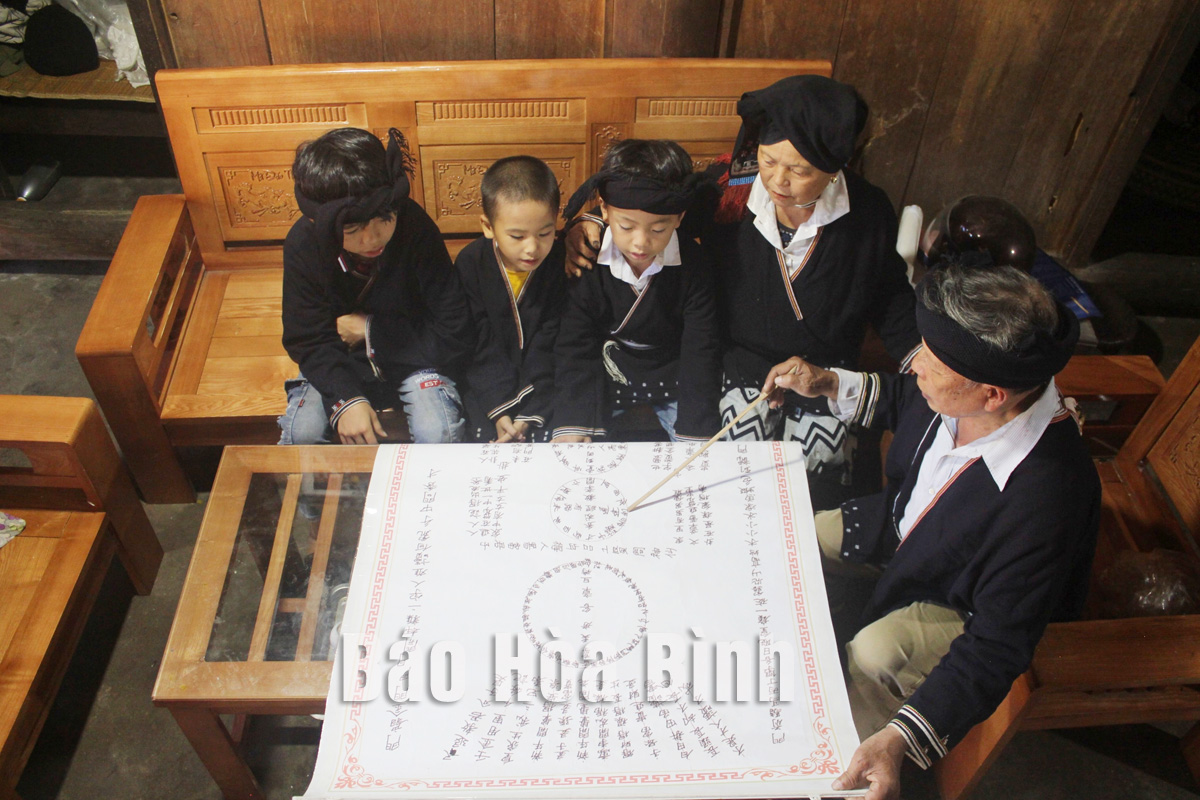
(HBO) – After years of overcoming difficulties and challenges to develop, Sung village of Cao Son commune, Da Bac district (Hoa Binh province), has made its name known in the tourism map of Vietnam. Tourism development has not only helped improve income but also created an impulse for local Dao Tien ethnic people to preserve and bring into play their traditional cultural values.
Ly Van Henh, a Sung villager of Cao Son commune (Da
Bac district), teaches the Nom - Dao script to children.
Located on Bieu Mountain – home to an ancient
forest, Sung hamlet boasts a cool and fresh atmosphere. Therefore, many
describe this place as an ideal getaway from the summer heat.
Affected by the COVID-19 pandemic for two years
(2020 - 2021), this village of Dao ethnic people has become an attractive
destination for domestic and international visitors since late 2022. Well-built
infrastructure, upgraded traditional-style houses, new services and,
especially, revitalised traditional crafts have made considerable changes to
Sung village.
Ly Van Henh, an elderly man teaching the
traditional Nom - Dao script of the Dao ethnic group, said his class has been
maintained for many years. By learning the script, young people can know how to
write the script and also gain a better understanding of their ethnic group’s
culture and moral standards, thereby helping uphold the good traditional
cultural values and develop community-based tourism as well.
Many traditional crafts of the Dao Tien people
have also been revived in Sung hamlet, including brocade weaving.
Ly Thi Thien, a woman in Sung village, said that
since local residents embarked on tourism, they have received assistance from a
project to set up a group of 12 brocade makers. The craft has helped them
produce not only beautiful clothes for their families but also an attractive
tourism product.
She perceived that tourism has given a facelift
to their village and improved their income. Her family and many others have
registered to provide accommodation services, and they hope to receive further
training in tourism skills and access concessional loans to create more
professional tourism services with higher economic profitability.
An official of the Da Bac culture and
information division said that preserving traditional culture is the key to
developing community-based tourism in the district. In Sung village, Da Bac
authorities have been helping locals improve their tourism skills as well as
recover, preserve, and bring into play the traditional culture of the Dao Tien
people in order to sustainably develop tourism and gain more economic benefits.
Aside from experiencing the traditional culture
of the Dao Tien people in Sung village, from here, visitors can go to explore
nearby destinations of Da Bac district such as Da Bia hamlet of Tien Phong
commune, Ke hamlet of Hien Luong commune, or Hoa Binh Lake that is dubbed "Ha
Long Bay on land”./.
With an increasingly vibrant and widespread emulation movement aimed at building cultured residential areas and cultured families, Yen Thuy District has been making steady progress toward improving both the material and spiritual well-being of its people, while fostering a civilized, prosperous, beautiful, and progressive community.
Once lacking recreational spaces and community facilities, Residential Group 2 in Quynh Lam Ward (Hoa Binh City) has recently received attention for the construction of a new, spacious, and fully equipped cultural house. The project followed the model of state support combined with public contributions in both labor and funding.
The "All people unite to build cultural life" movement, which has been effectively integrated with Kim Boi district’s socio-economic development goals, is fostering a lively spirit of emulation across local residential areas, hamlets, villages, public agencies, and enterprises. In addition, through the initiative, traditional cultural values are being preserved and promoted, while community solidarity and mutual support in poverty reduction and economic development are being strengthened.
A working delegation of the Hoa Binh provincial People’s Committee led by its Permanent Vice Chairman Nguyen Van Toan on June 11 inspected the progress of a project to build the Mo Muong Cultural Heritage Conservation Space linked to tourism services in Hop Phong commune, Cao Phong district.
Born and growing in the heroic land of Muong Dong, Dinh Thi Kieu Dung, a resident in Bo town of Kim Boi district, in her childhood was nurtured by the sweet lullabies of her grandmother and mother. These melodies deeply imprinted on her soul, becoming an inseparable part of her love for her ethnic group's culture. For over 20 years, this love for her hometown has driven Dung to research, collect, and pass down the cultural values of the Muong people to future generations.
In the final days of May, the Ethnic Art Troupe of Hoa Binh Province organized performances to serve the people in remote, mountainous, and particularly disadvantaged areas within the province. These were not just ordinary artistic shows, but they were the meaningful journeys aimed at spreading cultural values, enhancing the spiritual life of the people and contributing to the preservation of ethnic minority cultural identities.



